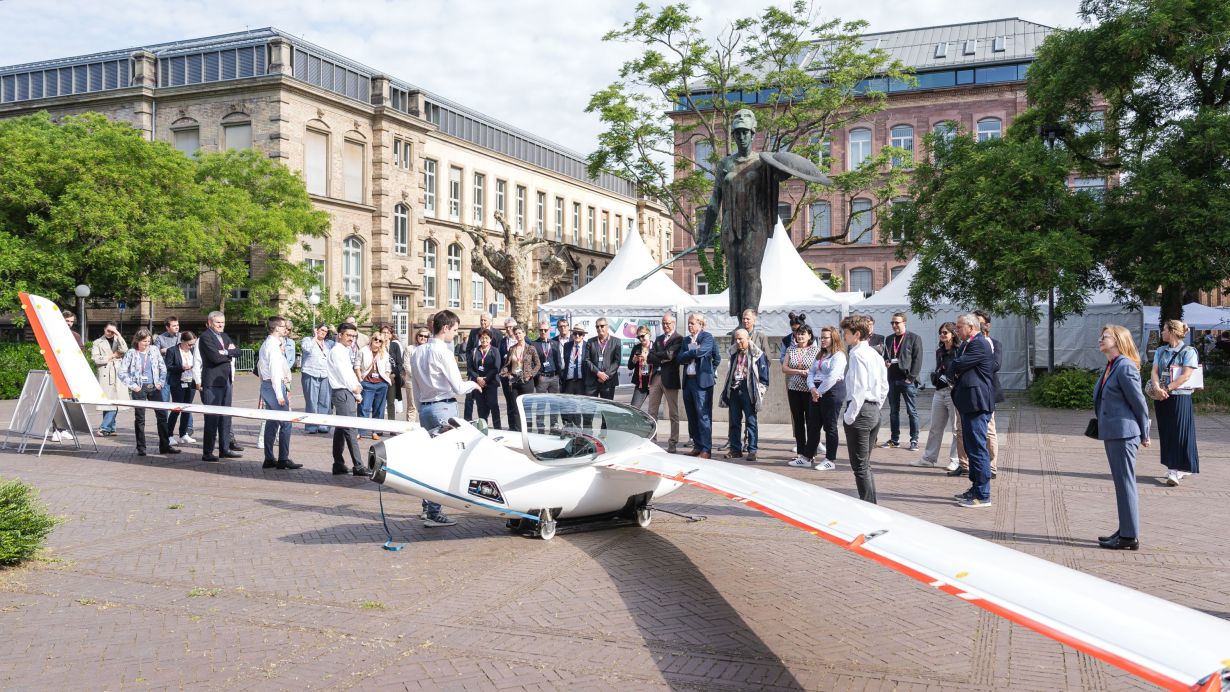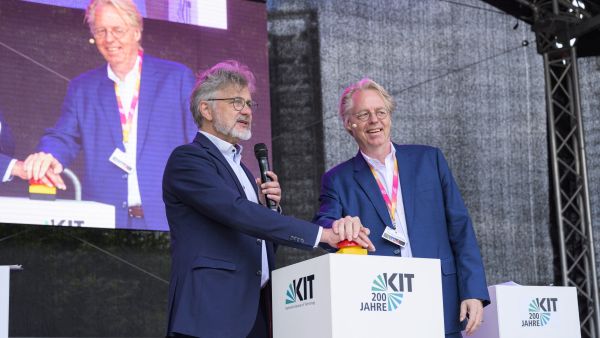
Around 23,000 (until 16:30 hrs) people of all ages interested in science made the Open Day at Karlsruhe Institute of Technology (KIT) a big success this Saturday, May 17. In warm spring weather, they experienced excellent science up close in institute buildings, lecture halls, and libraries, as well as outdoors, and in show tents. At the Campus Day, which was integrated into the event, numerous young people learned about the wide variety of courses offered at the KIT University of Excellence. Science shows, live podcasts, and a varied children's program rounded off the day, which also marked the beginning of the Karlsruhe EFFEKTE Science Festival in front of the castle.
Photos from the Open Day can be found here
You can find the latest videos and stories on our Instagram channel.
"Welcoming all these inquisitive, open-minded visitors here to our campus made this a really beautiful and special day," says Professor Jan S. Hesthaven, President of KIT. "Our overriding goal as KIT is to change society for the better with solutions we develop and people we train. The variety of topics as well as the inspiring organization of today's program by employees and students made it possible to fill this 'contract with society' with immediate insight and experience. I'm very happy about that." More than 1,500 KIT employees presented their topics in a wide variety of formats, such as join-in activities, lectures, and experiments. At the same time, young people were able to find out about more than 100 bachelor's and master's programs at the University of Excellence at the Campus Day.
Focus on Artificial Intelligence and Robotics
The program comprising more than 300 events gave visitors an impression of the whole spectrum that science at KIT covers. What's more, demonstrations, visits, join-in activities, and lectures showed how different disciplines interact when new knowledge and innovations emerge - from neutrino measurement and digital twin hearts to sustainable fridges.
The megatrends of artificial intelligence and robotics were key areas of interest. Whether humanoid robots, exoskeletons, brain-computer interfaces, or digitalized industrial production - the opportunity to gain your own impression by engaging in conversation with researchers was also very popular here.
The 200th anniversary of KIT, the common theme at numerous events this year, was highlighted in lectures on the history of science in Karlsruhe, as well as in the "Time Capsule" project where visitors could hand over objects to the KIT Archives that reflect personal messages or collective experiences.
Embedded Campus Day
This year's traditional KIT Campus Day was integrated into the Open Day. Supported by university groups and individual students, the eleven KIT departments presented their more than 100 bachelor's and master's programs. Through information lectures and individual advice, but also interactive activities, guided tours, and experiments, prospective students and their parents were able to find out what to expect from research-based studies at KIT.
Kick-off to the EFFEKTE Science Festival
The KIT visitors' day was also part of the nine-day Karlsruhe EFFEKTE Science Festival, which celebrated a grand opening weekend at Karlsruhe Castle on May 17 and 18. The President of KIT, Professor Jan S. Hesthaven, and the Mayor of Karlsruhe, Dr. Frank Mentrup, therefore kicked off the Open Day together. Mentrup also awarded seven KIT students the annual "Prize of the City of Karlsruhe for Students at Karlsruhe Universities" for their outstanding academic achievements.

Prof. Jan S. Hesthaven. (Photo: FUGEFOTO, KIT)
Further Information:
Photos from the Open Day can be found here
You can find the latest videos and stories on our Instagram channel.
Being "The Research University in the Helmholtz Association", KIT creates and imparts knowledge for the society and the environment. It is the objective to make significant contributions to the global challenges in the fields of energy, mobility, and information. For this, about 10,000 employees cooperate in a broad range of disciplines in natural sciences, engineering sciences, economics, and the humanities and social sciences. KIT prepares its 22,800 students for responsible tasks in society, industry, and science by offering research-based study programs. Innovation efforts at KIT build a bridge between important scientific findings and their application for the benefit of society, economic prosperity, and the preservation of our natural basis of life. KIT is one of the German universities of excellence.






